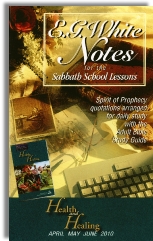|
||||||||||||||
Commentary on "The Environment"
Day 3: Monday, April 26, 2010
Today’s lesson, "The Sabbath Environment" focuses on the issue of the seventh-day.
Before we begin with the issue of the seventh-day Sabbath we must first identify and define two words that are used in the area of Biblical studies, that will be important when addressing one element from today’s lesson. The two words are exegesis and eisegesis.
Exegesis is the science of extracting information that is provided in the text being studied. It is the critical examination and explanation of a text, particularly of a Bible passage. When exegesis is practiced by a skilled theologian, no information is added to the meaning of the text than what is already found in the text itself.
Eisegesis is the practice of reading into a text information that is not included in the passage. It is the practice of unskilled theologians of reading one’s own ideas into a Bible text.
It is interesting to note that the lesson author, for the first question in today’s lesson asks the student to perform eisegesis. The question that is asked is:
Read Genesis 2:2, 3. What can we read into the fact that God Himself rested on the Sabbath day?
Before the question can be answered we must first look at the text that is mentioned to see exactly what it does, and does not say. Genesis 2:2-3 reads as follows:
And on the seventh day God finished his work that he had done, and he rested on the seventh day from all his work that he had done. So God blessed the seventh day and made it holy, because on it God rested from all his work that he had done in creation.
Verse two makes two points. First, God “finished” his work, and second, he “rested” from his work. The first word translated “finished” is from the Hebrew word kalah which means to be complete, or to end an activity. The word translated “rested” is the Hebrew word shabath which means to cease, desist or rest.
We know that God does not get tired in a human sense. He did not need physical rest after his work of creation, for God is not a physical being. When we understand God as resting, we cannot think anthropomorphically. In other words, we cannot apply human attributes to God. We cannot create God in our image.
The lesson author asks the question without defining the meaning of the words in the Biblical text. We cannot read that passage with a human understanding of rest. Verse two is simply stating that God finished or completed his work of creation.
When understanding the use of the Hebrew word shabath we must also not apply human attributes to God. Here we must also understand the idea of God “resting” in terms of his completing his work. In other words, God’s work of creation came to an end. He ceased from his work of creation.
Verse three tells us that God “blessed the seventh day and made it holy” because he completed his work of creation. It is at this point that we must take a look at what the lesson states next. We read:
God Himself, in the role of Creator, keeping the seventh-day Sabbath? Talk about showing us the deep roots of the Sabbath! Whatever the implications of that idea, one thing is sure: the seventh-day Sabbath came from God long before there ever was a Jewish nation and people.
The Biblical text says nothing about God “keeping the seventh-day Sabbath.” To state that God is a law-keeper is to subject God to his creation. God is and ever will be above and beyond his creation. The text also does not state that the seventh-day that is described in this passage is like the other days that God created in its duration. For each of the six previous days, scripture states that “there was evening and morning” for each day. This is not the case for the seventh day. The seventh day is blessed and made holy by God because in it God completed his work.
To state that God kept the seventh-day Sabbath is to suggest that when the seventh day was over God continued with his work. This is not the case. When God completed his work it was not a partial job – it was complete. God did not continue with creation work on the eighth day. He was done.
Although not specifically related to the issue of creation, Charles Stanley has written about the issue of whether law-keeping by Christ is how righteousness came to us. (Charles Stanley of Rotherham, England is not to be confused with the contemporary Southern Baptist pastor of the same name. He lived from 1821 to 1890 and was a simple, itinerant preacher who led thousands to the Lord in the British Isles during the 19th century.)
But is this Christ keeping the law, and that placed to man's account to restore him, and make good his standing before God as a law-keeper? Does righteousness come in this way by law? If so, there is no meaning in redemption. And it is remarkable, that wherever this different gospel is preached, which is not another gospel, redemption is not understood and seldom referred to.
What is redemption? Now, before reading another line, take a sheet of paper, and write down what you understand by redemption, especially if you have held that Christ's keeping the law is one half of our salvation, and His atoning death the other half. (The entire article can be found at this internet address: http://www.votbg.org/stanley002.htm)
Here we need to note the following from the Quarterly, “the seventh-day Sabbath came from God long before there ever was a Jewish nation and people.” The Bible also does not indicate that this shabath of God was given to anyone at this time. Scripture simply states that God rested on the seventh day. God completed his work. God ceased from his work of creation. Nothing more.
The problem with eisegesis is that we can add all kinds of meanings to passages found in the Bible that are not contained there. This is the same logic that is used by Jehovah’s Witnesses who teach that we are not to receive blood transfusions. They point out that God told the Israelites that they were not to eat blood. They then define what it means to eat blood. After redefining the meaning of “eat” they finally arrive at the teaching that we must not receive blood transfusions. They have performed eisegesis on a very simple passage of scripture that has absolutely nothing to do with health or the medical practice of blood transfusions
There are many other issues with today’s lesson. Many books have been written about the issue of the seventh-day Sabbath from many perspectives. We suggest one title that may be of help to you if you are having questions about teachings of the seventh-day Sabbath. The book is titled, Sabbath in Christ and is written by Dale Ratzlaff. It can be obtained through Life Assurance Ministries at the following website, or just contact us here at BibleStudiesForAdventists.com and we’d be glad to assist you. Go to this website to obtain Sabbath in Christ: http://www.lifeassuranceministries.com/product1.html
Finally, is there any Biblical teaching for Christians that specifically deals with the issue of Sabbath-keeping? Yes! Paul wrote a letter to the Church at Galatia addressing issues that were infecting the believers there. Although much of the letter addresses the issue of circumcision, the issue of keeping the Sabbath is addressed in Gal. 4:9-11. Here we read,
But now that you have come to know God, or rather to be known by God, how can you turn back again to the weak and worthless elementary principles of the world, whose slaves you want to be once more? You observe days and months and seasons and years! I am afraid I may have labored over you in vain.
These are pretty serious words. Here God has revealed that observing days is equated with turning back to “the weak and worthless elementary principles of the world” and slavery. Paul is even concerned that his labor of bringing the gospel to the Galatians was in vain.
Let’s rejoice that God has delivered us from all bondage, including the bondage to his own law. That bondage was one of God’s ways of preparing Israel for the Messiah. If you’ve received Jesus the Messiah you have been delivered from the bondage of the law.
Summary
- Exegesis is the practice of extracting from a text the information that it contains. This practiced by Christians who read the Bible to understand what God has said and done.
- Eisegesis is the practice of reading into a text information that is not contained in that text. This is generally practiced by those who have already arrived at a conclusion and are looking for support for a position by scripture. This is a part of what is known as “proof-texting.”
- God blessed the seventh day and made it holy, and rested on the seventh day.
- God did not give the seventh-day Sabbath here. To see the seventh-day Sabbath as being given here is to perform eisegesis.
- God’s rest cannot be thought of in physical terms. He is not a physical being nor does he tire as his creatures do. We cannot anthropomorphize God – i.e., we cannot make God in our image. When we ascribe human attributes to God we are guilty of making God in the image of man.
- The seventh day has no evening or morning as the other six days had. There was not an end of the seventh day at which God returned to his work of creation. The creation was complete. Period. Ended. Shabath.
- God is not a law keeper. He is not a creature that he should be subject to laws. Charles Stanley (the 19th century British preacher) pointed out the problem of identifying the law-keeping of Christ as a part of our redemption. (See article mentioned above.)
- The logic that is used in today’s lesson to support the keeping of the seventh-day Sabbath is the same logic that is used by Jehovah’s Witnesses to deny blood transfusions. Physical ruin and death have come to many Jehovah’s Witnesses because of this eisegesis. Spiritual ruin can come through Sabbath-keeping.
- If you have come to be known by God you have been freed from the bondage of God’s law, which for the Christian are now considered “weak and worthless elementary principles of the world.”
Copyright 2010 BibleStudiesForAdventists.com. All rights reserved. Revised April 22, 2010. This website is published by Life Assurance Ministries, Glendale, Arizona, USA, the publisher of Proclamation! Magazine. Contact email: BibleStudiesForAdventists@gmail.com.
The Sabbath School Bible Study Guide and the corresponding E.G. White Notes are published by Pacific Press Publishing Association, which is owned and operated by the Seventh-day Adventist church. The current quarter's editions are pictured above.
Official Adventist Resources
Standard Edition Study Guide Week 5
Teacher's Edition Study Guide Week 5
Easy Reading Edition Study Guide Week 5
Search the Complete Published Ellen G. White Writings


